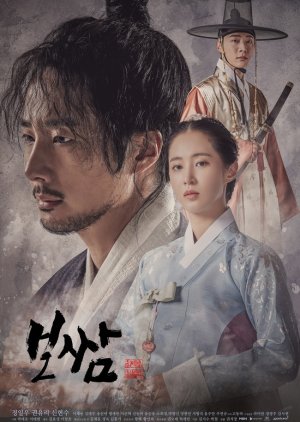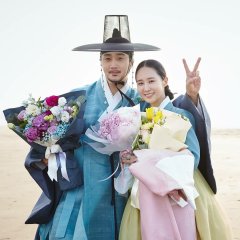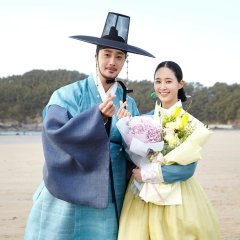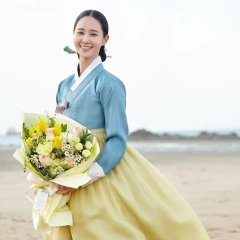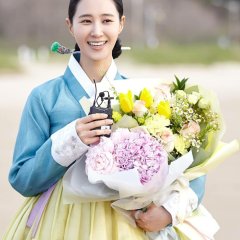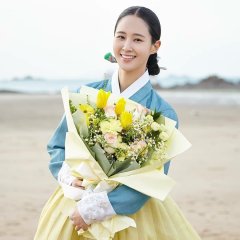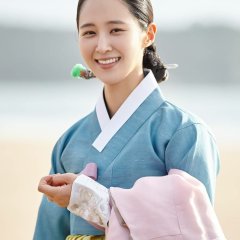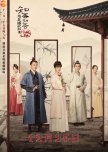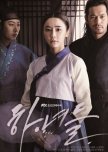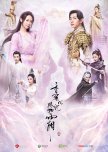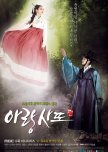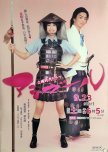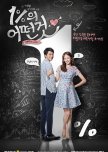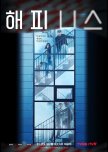 EXO's Suho confirmed to lead "The Crown Prince Has Disappeared"
EXO's Suho confirmed to lead "The Crown Prince Has Disappeared" "Bossam - Stealing Fate" racontera l'histoire d'une personne qui kidnappe accidentellement une princesse. Jung Il Woo se serait vu offrir le rôle principal de Ba Woo, qui s'adonne à une pratique consistant à mettre en relation des veuves, n'ayant aucun espoir de se remarier, avec de nouveaux maris. Il a été piégé pour conspiration à un jeune âge et bien qu'il ait pu s'échapper avec la vie sauve, il a dû cacher son identité et vivre dans la pauvreté depuis. Ce drame se déroulera sous le règne du roi Gwanghae, et tournera autour de Ba Woo et de la princesse Soo Kyung. Il s'agira d'une histoire de vie et d'amour qui touche à l'oppression subie par les femmes et les personnes démunies. Modifier la traduction
- Français
- Arabic
- Русский
- Português (Brasil)
- Titre original: 보쌈-운명을 훔치다
- Aussi connu sous le nom de: Bossam - Unmyeongeul Humchida
- Réalisateur: Kwon Seok Jang
- Scénariste: Kim Ji Soo, Park Chul
- Genres: Historique, Romance, Vie quotidienne, Drame
Où regarder Bossam - Stealing Destiny
Distribution et équipes
- Jung Il WooBa URôle principal
- Kwon Yoo RiSu Gyeong / Princess Hwa InRôle principal
- Shin Hyun SooLee Dae YeopRôle principal
- Kim Tae WooKing Gwang HaeRôle Secondaire
- Lee Jae YongLee I CheomRôle Secondaire
- Ko Dong HaCha Dol [Ba U's son]Rôle Secondaire
Critiques
Pourquoi une veuve de Joseon n'a-t-elle pas le droit de se remarier ?
Je l’ai beaucoup apprécié, même si ce n’est pas le drama qui vous tient debout jusqu’à 4 heures du matin, mais cependant le scénario solide, les rebondissements très bien articulés et restant vraisemblables, maintiennent l’intérêt jusqu’au bout.On va retrouver un Roi malmené par ses ministres, surtout l’affreux Conseiller de l’Est, des familles déclassées, des héritiers nobles cachés sous des haillons, une princesse belle et bonne…. Cependant pour une fois ces personnages ont l’air vrai, dans le cadre du Joseon du 17ème siècle. Le Roi est pris dans l’engrenage de tout homme au pouvoir : ménager les puissants, essayer de penser au peuple sans se faire empoisonner par les nobles… Il n’y a pas de débordement de costumes, décors et autre tape à l’œil, mais des personnages attachants, et une intéressante vue sur la politique extérieure de Joseon !
Il y a une certaine dose d’humour assurée par Chub Bae et la dame de Cour Jo, couple drôle et improbable, ainsi que par la présence de l’enfant, et les dialogues sont très bons.
Pour peu qu’on s’intéresse à l’histoire coréenne, elle est ici bien présente, le roi Gwanghae a bien existé, les évènement sont relativement proches de la réalité historique sans que ce soit pour autant la grande fresque façon « Empress Ki » ou « 6 flying dragons » Le Roi voudrait sortir de l’influence de la Chine pour s’allier aux Mandchous (historique) mais il ne le pourra pas, ce qui entraînera la Corée pour longtemps dans cette voie sans issue de l’alliance chinoise.
Si vous avez vu « Live up your name » qui se passe pendant l’invasion japonaise (guerre d’Imjin) ce drama se passe quelques années plus tard…
Mais même si vous n’en avez rien à faire de l’histoire de Joseon, le drama en lui-même est très intéressant, les situations bien écrites. La relation de Ba Wu et de la princesse colle parfaitement à ce qu’elle aurait pu être réellement à cette époque-là : sincère, forte, pudique, respectueuse de la coutume, mais sachant passer au delà…
Ce drama est un sageuk à part, qui préfère les personnages, leur histoire et leur psychologie aux combats, aux riches costumes et décors somptueux, bien que tout à fait enraciné dans l’Histoire et l’époque.
Pour finir, je le conseille vivement !

Highly entertaining but also frustrating
Bossam: Steal the Fate managed to be one of those intensely polarizing dramas where many viewers laud the series as the greatest, most engaging thing ever to grace the small screen, while others condemn it as a terrible waste of time. This drama was able to achieve the highest viewership ratings (9.8%) of any drama in MBN history, and yet, if you read the reviews and comments on MDL, you will sense the opposite sentiment.As for me, I liked this well-written, intelligent and enlightening show that showed me another aspect of Korea's historical culture. Bossam was a custom in the Joseon period, in which a single man himself or through a hired hand kidnaps a widow by wrapping her up in a blanket at night and then makes her his wife. During those days, it was a way of getting remarried and an opportunity to get a new life for the widow who was obliged to live alone after her husband's death. Based on this custom, the drama unfolds the uncliched love story between the leading couple as they experience conflicts between social classes and families and survive being in the center of political struggles and turmoil.
Why highly entertaining?
From the get-go with the opening scene illustrations, I found this drama to be quite unique. It is a historical drama accompanied by non-traditional touches like the selection of eclectic songs and background music. The music producers deserved credit for being prolific and delivering quality tracks. The OST or BGM that underscored each scene was truly fitting and had elevated it to the next level for me.
Furthermore, the cinematography and directing were also a big part of the show's appeal, as one can tell that a lot of thought was put into each scene to evoke the necessary emotion and feeling. Every episode was nicely shot and expressed. Even details like how the hanbok skirt formed in a perfect circle surrounding a sinking woman was impactful. The settings and landscapes were lovely, like works of art. Visually, it was a treat to watch this show. The costumes and makeup also stood out for me because the show did not go for an idol drama feel with overdone makeup or glaringly obvious colors. The actors looked normal, good-looking nonetheless but refreshingly ordinary.
Acting-wise, I am impressed. I have heard of Jung Il Woo's ability but this is my first drama of his and I am blown away. He clearly has the experience and acting chops to pull off a complex character like Ba Woo, born from nobility but grew up a street rat. Shown initially as a rogue who was obviously a little damaged, it was also quickly apparent that our male lead, the heroic outlaw, was a good and generous person at heart. Jung Il Woo's micro-expressions were on point, and there was an underwater scene where he executed the scene perfectly by just his expression alone. His visuals are not my usual preference, but in this show, in that persona, Il Woo just exuded manly sexiness.
Shin Hyun Soo's character, Lee Dae Yeop, got a lot of hate for being the clingy second male lead who could not move on. However, I had a soft spot for Dae Yeop, especially after finding out his back story and romance with the Princess as well as his background. His actions may have seemed rash and selfish at first, but he never wavered from his desire to protect and ensure the happiness of the only one he loved. I had high hopes for his character development, and he did not fail me up to the finale. My heart ached for him a lot, and Shin Hyun Soo was brilliant in portraying this lost soul. With his eyes alone, Hyun Soo showed the hopelessness and defeat that Dae Yeop must have felt, trapped with no way out between his family, duty, love, and his own desires.
Kwon Yu Ri, however, is the show's biggest hidden gem. Her acting as Soo Kyung/Princess Hwa In, a demure, well-bred but humble Princess who was also passionate, brave, and intelligent, left a firm impression. Knowing that she is a Girls' Generation member, I was not prepared for her wonderful performance. In a way, this drama was also about how the Princess chose her own happiness by freeing herself from the societal rules and obligations, and Kwon Yu Ri portrayed this character's growth well. I appreciate the female empowerment theme featured in this show, like when Ba Woo constantly praised and respected Soo Kyung's intelligence and strength.
With the addition of seasoned actors like Shin Dong Mi, Song Sun Mi, Seo Beom Shik, Yoon Joo Man, Kim Tae Woo, Lee Jae Yong, and Lee Joon Hyuk, you have a cast that was able to deliver the story effectively. The child actor, Ko Dong Ha, who played Cha Dol, has potential as well.
I love that the characters were shades of gray. We had the antagonists who felt justified in their actions, people on both sides helping each other for justice and principles, and there were the protagonists who made bad decisions, said and did things they did not mean in the heat of the moment. The show scored points with dynamic characters who struggled with their actions, who were not always clear if they were doing the right thing or what the right thing even was.
To me, the show's strongest point is the way it executed the plot. I liked how the drama encouraged and engaged the viewers' imagination. It was my imagination that filled in and enriched what the show's visuals or soundtrack both concealed and alluded to at the same time. At least, I prefer to think that what was left out was not a mere lack but instead a conscious artistic act of intentional omission and suggestion. Coupled with somewhat predictable plot twists but, when revealed, were simply shocking in terms of magnitude and nature, the result was a story that kept me engaged from start to finish, with each episode leaving me eager for the next one.
Why frustrating?
Even though I appreciated the moments of omission and suggestion, the conspicuous use of them for the romance between Ba Woo and Soo Kyung left me wanting for more. The chemistry between those two was palpable, and I wanted to see more than hugs. Ideally, I would have preferred more tantalizing or passionate scenes, but if not those, then at least some other obvious display of affections that provide the anticipation and build-up that one usually seeks in a show with a romance tag. That said, I did find the scenes between the leads incredibly romantic, especially with the setting, music, and dialogue. There was a dignified and pure way about how their love for each other was shown, and I did believe that they truly loved each other. I also like the phrase they used for each other "saranghae yeon-mohada (연모하다)" which means to love and long for someone. Seeing them together left a good feeling and I was satisfied with how they ended.
With the romance underplayed during the second half, the show somewhat got derailed by the heavier focus on the palace and court politics. The villain, Lee Yi Cheom, constantly got on my nerves with his audacity and arrogance, but really, this was a good thing because it showed how terrific the writing was. I was glued to the screen, on the edge of my seat, wondering what was going to happen to the OTP and the other good guys. Had I not wanted more romance and pleasant "slice of life" episodes featuring the main couple, I would have appreciated the political shenanigans even more.
Overall
I would rewatch this drama since there were many nuances and subtlety that I may have missed the first time. I also enjoyed the story and characters enough to watch them another time, although I am unsure if I want to feel Dae Yeop's pain again.
I do recommend that you try this drama out and see for yourself. Thematically for me, Bossam: Steal the Fate is a show that encapsulates life in many aspects and topics. It touches upon self-identity and personal growth, love (romantic and familial), respect and loyalty (to self, family, country, and principles), politics, societal obligations and problems, the balance of power and inequality, friendship, and more.
Side note:
For posterity, I have enclosed the link to the soundtrack list: https://en.wikipedia.org/wiki/Bossam:_Steal_the_Fate#Original_soundtrack

